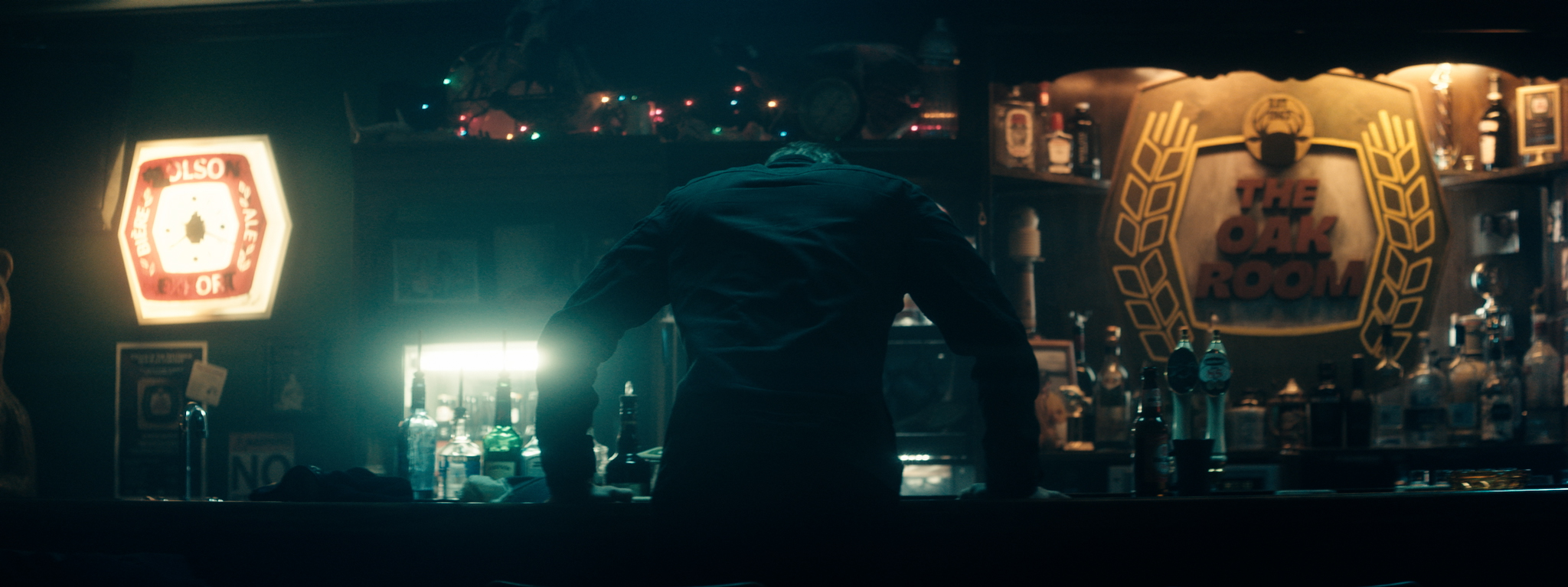What to Watch Verdict
'The Oak Room' pours a suspicious drink that's thick and frothy, as intrigue bubbles the more characters take one another's words for granted.
Pros
- +
🍺 Suspense through narrative.
- +
🍺 Rural table setting.
Cons
- -
🍺 A slower midsection.
- -
🍺 Concept won't work for all.
Cody Calahan’s The Oak Room emphasizes the power behind a good story. An isolated thriller takes place within a barroom, between tender and patron, like something Quentin Tarantino would appreciate. Each character spins their yarn - what’s revealed first, what’s held for impact - and dictates who holds the cards. “Yes, Matt, we know how storytelling works.” Right. But the way screenwriter Peter Genoway exploits liquor-soaked anecdotes, and the importance words hold, is a step-up in how character dynamics shift with each winding sentence. Command an audience, and you can get away with murder—very Fargo vibes, where silver tongues trump brainless action.
Steve (RJ Mitte), a college dropout who didn’t even attend his own father’s funeral, returns to his chilly Canadian hometown. He walks into a bar, post-close, much to bartender Paul’s (Peter Outerbridge) disdain. You see, Paul demands payment for funding Steve’s father’s funeral. Steve offers a story as compensation. Paul chuckles, says he has until midnight before other locals arrive at the bar who would love to “reconnect” with Steve, so why not, he’ll listen until then. So begins Steve’s tale, which uses names and locations that become too familiar for Paul as reality and make-believe blend together.
I make the Tarantino comment above because few filmmakers love hearing their characters squawk as much as Quentin. The way they banter in monologues and favor non-linear approaches to elongate drama. The Oak Room could be over in twenty minutes, but what’s the fun in that? Paul needs to keep Steve in-place until his reinforcements arrive. On the other hand, Steve could reach his anecdote’s purpose in a matter of minutes if he’d prefer but instead drags each sentence. One man assumes he’s in control, while the other fawns naivety and helplessness. Oh, how an hour changes everything.
Calahan’s direction is intimate, isolating, and about the “heat of the moment” (or lack thereof as Steve remarks how the snowfall against Paul’s establishment window looks like “a movie”). Steve’s story is one of unlikely strangers in a bar, recognizing his current predicament with reflective intent. Paul, when attempting to belittle Steve’s perceived inabilities to understand spoken flow, reveals how the young man’s actions weighed heavily upon father Gord (Nicholas Campbell) in his last days. The farther into The Oak Room we’re steeped, the more twisted histories become, the more maybe-fictional, maybe-known characters expose truths that embolden Steve’s potboiler. A meek, directionless “loser” who’s despised by Paul, and yet, what’s pegged as ineptness in delivery is given new context and cleverness once the proverbial rug is yanked, exposing the rewards of a killer hook.
The make-or-break for most will hinge on the performances of RJ Mitte and Peter Outerbridge. The former a wayward son who didn’t amount to “a pile of shit” as his daddy predicted, the latter an Anywhere, USA barkeep who perfected the craft of conversations with alcoholics. As a frequent bar visitor, in the before times, I’m smitten by their rivalry, the rural pageantry, that takes place over libations. How country hospitality leads to bloodshed, and the known sins of one unearth the hidden secrets of another. It’s an exercise in being the loudest versus being the one with something of substance to say. Not only a lesson in oratory execution but a commentary on how society values brashness and charisma sometimes to a fault because, well, too many people out there have mastered the art of “goosing” the truth (Paul's colloquialism for fudging the details to entice listeners, whether true or false).
In acknowledgment, The Oak Room is a bit slower to the punch than I’d generally favor, and one particular story seems drawn-out. Still, I’m a sucker for chamber pieces that smell of cask barrels, wooden countertops stained by generic “lite” lagers, and a certain kind of beaten-path mustiness that’s essential to any nowheresville dive. An after-hours chewing of one’s ear that’s about fate, and how locking your door ten minutes earlier might even save your life. It’s not the perfect drunken fable but works as an example of how a tall tale can be so much more than entertainment. Never quick to the draw, Cody Calahan relishes the spoken-word chase. Maybe not “a story worth one thousand words” (as Steve quips), but I’ll grant it at least seven-hundred.
The latest updates, reviews and unmissable series to watch and more!
Matt Donato is a Rotten Tomatoes approved film critic who stays up too late typing words for What To Watch, IGN, Paste, Bloody Disgusting, Fangoria and countless other publications. He is a member of Critics Choice and co-hosts a weekly livestream with Perri Nemiroff called the Merri Hour. You probably shouldn't feed him after midnight, just to be safe.


